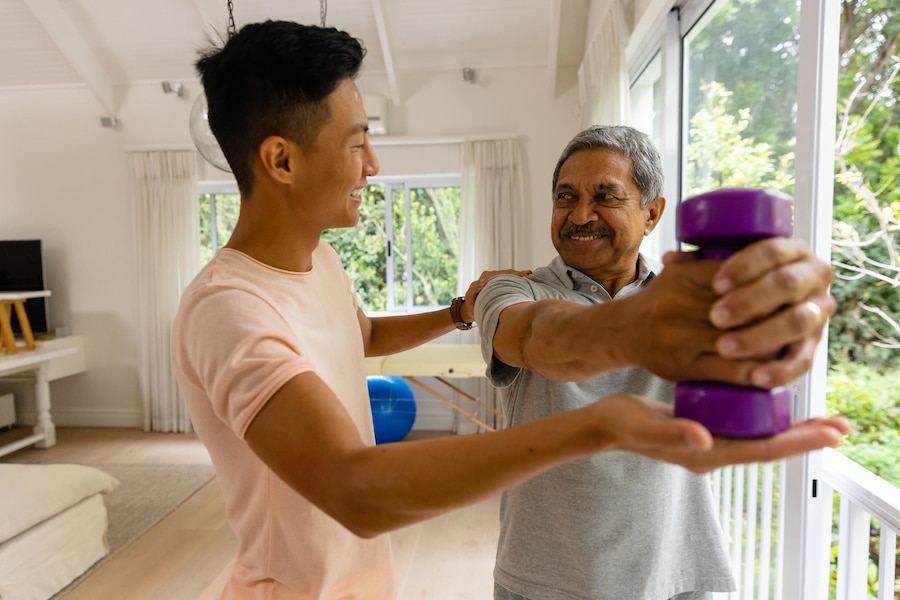Women spend a lifetime looking after others and often ignore their own wellbeing.
Let’s have a look at women’s health issues after 55 and how to prevent them.
It’s important for women to take care of themselves. A lifetime of looking after their families, often means that they’ve neglected themselves, which leads to health issues as they grow older
Ability of the body to bounce back to normal after an illness or a stressor is homeostasis, and this ability decreases as one ages due to decreased reserve and hence older women are more prone to diseases and complications of these diseases.
Heart Disease
As you grow older, your heart, which is a muscle, becomes less efficient and has to work much harder to pump blood through your body. Also, fatty deposits might build-up in the blood vessels of the heart, leading to loss of elasticity. This combination means a heart that’s not that efficient with blocked arteries that prevent the blood flowing properly throughout the body. This can lead to hypertension, stroke, and heart attack.
Prevention
- Eat a wholesome, balanced diet that’s low in sodium and saturated fats
- Exercise regularly.
- Do walking as this is the most affordable and best exercise for almost everyone. Get your cholesterol levels and blood pressure checked regularly.
Incontinence
Women over the age of 50 are more likely to have urinary incontinence. This is because the pelvic muscles lose strength, and aren’t able to control the bladder as well as they did before. Some of the other reasons for incontinence after menopause include less elasticity in the vaginal tissue and thinning of the lining of the urethra. This leads to a few types of incontinence: stress incontinence, which means that you leak out some urine when you laugh, sneeze or cough; urge incontinence, when the need to urinate comes very suddenly; nocturia, where some women feel the need to use the bathroom several times at night; and, painful urination, which may happen because urinary tract infections that some may get more frequently after menopause.
Prevention
- Tighten your pelvic floor by doing Kegel exercise. Try to do three sets of 10 of these exercises every day.
- Limit your consumption of alcoholic beverages as well as soda, tea and coffee as these will fill up your bladder more quickly.
- Keep your weight in check because if you’re on the heavier side, then this will put pressure on your bladder.
Osteoporosis
When you age, your body absorbs your old bone tissue faster than it can create new bone tissue, which makes your bones weaker. This condition is called osteoporosis. The bones become so thin and fragile that they can easily break when you fall or sometimes, while you are going about your daily lives. It is estimated that 1.5 million fractures happen every year because of osteoporosis. Women are more susceptible to osteoporosis because they lose more bone mass right after menopause.
Prevention
- Since osteoporosis doesn’t have any symptoms, it’s a good idea to schedule a bone density test. This is called a DEXA scan and it checks your bone health.
- Check with your doctor about taking calcium supplements.
- Also, include calcium-rich foods in your diet like green, leafy vegetables, milk products like homemade cottage cheese, tofu and yogurt.
- Include some weight-bearing exercises in your fitness routine as these help to build bone density and muscle strength.
Depression
Many women suffer silently as they battle with depression, which also impairs their daily functioning. It is estimated that 7% of the elderly population suffer from unipolar depression. Post-menopausal women are more prone to suffering from depression because when there is a dip in the level of oestrogen in the body, mood-regulating brain chemicals like norepinephrine, dopamine and serotonin also get disrupted, which can lead to depression. Also, women who’ve had hormone-related mood issues like severe PMS or postpartum depression, are at a higher risk of getting depression.
Prevention
- Take some time out everyday to nourish yourself. This could be as simple as 15-minutes to read a good book, or listen to music. Take up a new hobby to ward off depression and feel good about learning a new skill.
- Make time to exercise regularly. Whether it’s a short walk, 20 minutes of yoga or even an hour of golf, exercise will trigger endorphins, those happy hormones that’ll help in preventing depression.
- Yoga is one of those exercises that helps keep my body fit, the bones strong and the mind fresh and happy.
- Try talking to a therapist or even a good friend, if you feel an issue is weighing you down.
- Ultimately, if you need treatment, don’t hesitate to reach out to a health practitioner or therapist for medication and therapy to treat your depression.
Anxiety
Anxiety is one of the least talked about health issues that women over 55 suffer from.
Women have more anxiety disorders than men due to chemical differences, hormonal changes and different responses to neurotransmitters.
Anxiety is a mental health issue, wherein the affected person cannot stop worrying about a problem, situation or even the future, to the extent that sometimes it can hamper day-to-day living. Anxiety can even lead to panic attacks, high blood pressure, palpitations, dizziness and insomnia.
If you suffer from any of these symptoms or suspect that you have an anxiety disorder, do not hesitate to reach out for help. Visiting a psychotherapist or a psychiatrist is a good place to begin. If you can find a collaborative care model, where allied health professionals work in tandem with primary care physicians, then that might be one of the best ways to address anxiety issues.
Prevention
- If you feel yourself getting anxious about an issue, talk to a trusted friend, your spouse or even a psychotherapist. Don’t let the anxiety fester to the point that it leads to an anxiety attack.
- Stay social and meet with your friends regularly, to stay happy.
- The feel-good factor of this kind of work also helps work through one’s own anxieties. Understand what events causes anxiety and try to avoid these and if unavoidable, try to alleviate this by doing breathing exercises.
So whether you are in your late 50s, mid 60s or early 70s, do pay some attention to your health. Arm yourself with information, re-create your lifestyle to stay more active, mentally and physically, nourish yourself with nutrient-rich foods, and nurture yourself by doing more of what you love. Stay healthy, stay happy in your silver years.



